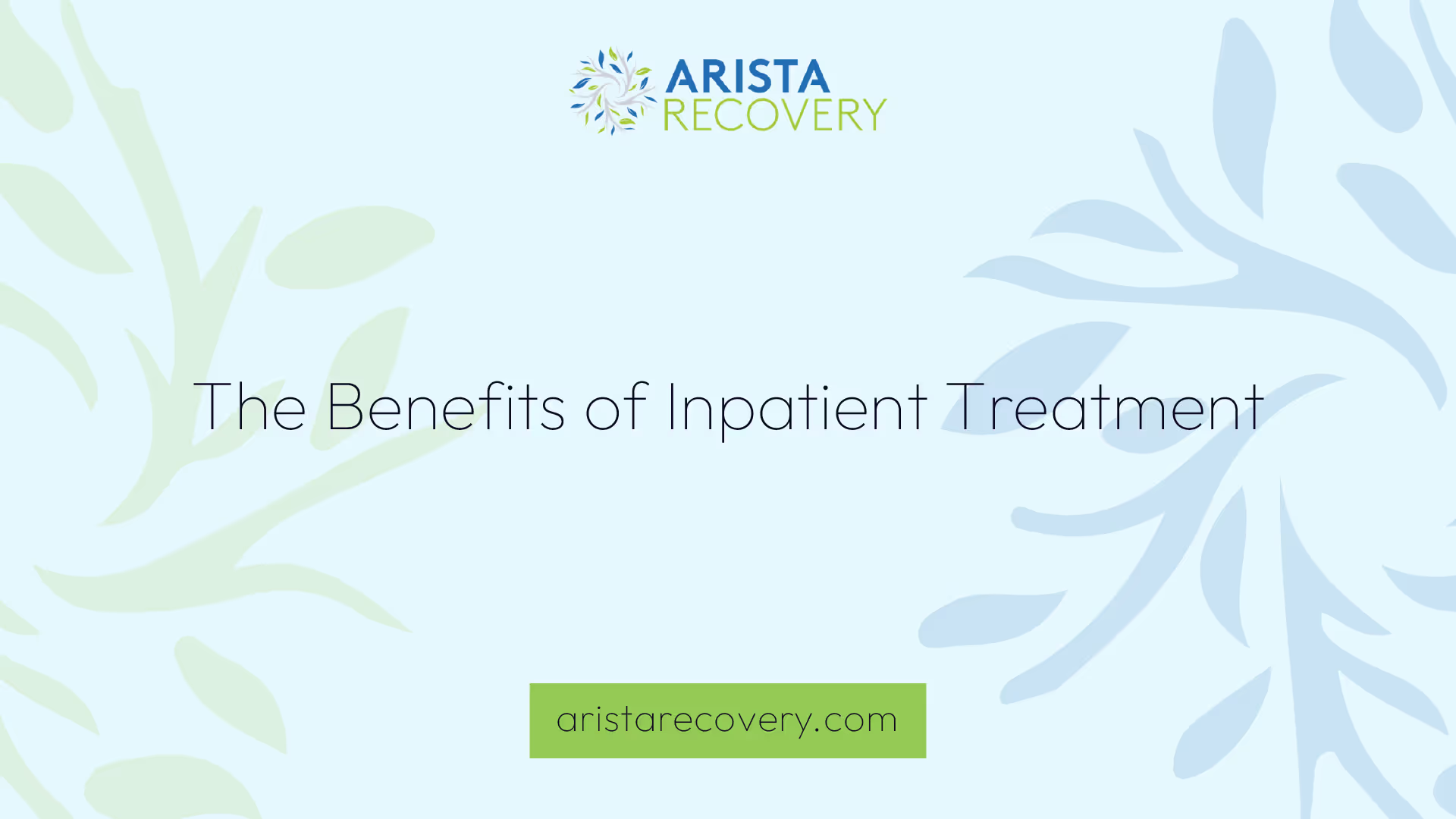
The Benefits of Inpatient Treatment
Understanding Inpatient Treatment
As we explore the benefits of inpatient treatment, it's important to first understand what this type of treatment entails. Inpatient treatment, also known as residential treatment, is a comprehensive form of care designed to support individuals in their recovery journey.

Definition and Duration of Inpatient Treatment
Inpatient treatment refers to an intensive form of care where individuals reside in a specialized facility and receive around-the-clock support and treatment [1]. This type of treatment is typically recommended for individuals who require a higher level of care and supervision due to the severity of their condition.
The duration of inpatient treatment can vary based on the individual's needs and the nature of their condition. On average, individuals may stay in an inpatient rehabilitation facility for about 30 days. However, for more severe cases, programs may offer longer lengths of stay between 60-90 days.
Inpatient treatment provides a structured and supportive environment that promotes healing and recovery. It offers a routine that includes therapy sessions, group activities, and opportunities for self-reflection and personal growth, allowing individuals to focus solely on their recovery without the distractions and triggers of the outside world.
Types of Facilities for Inpatient Treatment
Inpatient treatment facilities are designed to provide a conducive environment for recovery. These facilities provide round-the-clock supervision and support, ensuring the safety and well-being of individuals, especially during the early stages of recovery when relapse risks may be higher [1].
Inpatient facilities vary in their approach and amenities, but they generally provide access to intensive therapy and counseling services that are crucial for addressing the underlying issues contributing to addiction or mental health conditions. These facilities also provide a safe place for detox, where medical professionals can monitor vitals and ease unpleasant withdrawal symptoms.
The community aspect of inpatient treatment is also crucial for recovery. These facilities provide a community of support, offering social resources and relationships that are essential for the recovery process [2].
By understanding the nature and structure of inpatient treatment, we can better appreciate the benefits it offers to individuals on their road to recovery.
Benefits of Inpatient Treatment
Inpatient treatment is a comprehensive form of care for individuals struggling with substance use disorders and other related conditions. It provides a multitude of benefits that contribute to a successful recovery journey. Here, we will delve into the benefits of inpatient treatment, focusing on the 24/7 medical support, the structured approach to recovery, and the high completion rates for detoxification programs.
24/7 Medical Support
One of the primary advantages of inpatient treatment is the provision of 24-hour medical support. This constant care and assistance ensure that individuals have immediate access to medical services whenever needed.
Such round-the-clock monitoring and support offer the highest level of care available for substance use disorders (SUD), catering especially to those with moderate to severe conditions.
Access to 24-hour medical attention is also critical in addressing withdrawal symptoms during detoxification. Substances like synthetic opiates, benzodiazepines, alcohol, and heroin can lead to fatal withdrawals, and the medical care provided during inpatient treatment can mean the difference between relapse and recovery [5].
Structured Approach for Recovery
Inpatient treatment offers a structured and immersive approach to recovery. It allows individuals to fully commit to their recovery journey without the distractions and temptations found in everyday life.
These programs provide a daily schedule of multiple therapeutic activities, creating a structured environment that aids in the recovery process. This structured approach helps individuals develop new, healthier habits, learn coping mechanisms, and focus solely on their recovery journey.
High Completion Rates for Detoxification
Studies have shown that inpatient treatment yields higher completion rates for detoxification programs compared to outpatient treatment [3].
The supportive and controlled environment of inpatient treatment, along with the continuous medical care, contributes to these high completion rates. Individuals undergoing detoxification in an inpatient setting are less likely to relapse due to the immediate intervention available during periods of intense cravings or severe withdrawal symptoms.
Overall, inpatient treatment offers several significant benefits, making it a beneficial option for those seeking recovery from substance use disorders. The round-the-clock medical support, structured approach, and high completion rates for detox programs are just a few of the reasons why many people find success in inpatient treatment.
Inpatient Treatment and Substance Use Disorders
The correlation between the severity of substance use disorders (SUD) and the benefits of inpatient treatment is clear. Inpatient treatment programs provide a structured and supportive environment that is particularly effective for individuals struggling with moderate to severe SUD.
Severity of Condition and Inpatient Treatment
Inpatient treatment, also known as residential treatment, is designed to treat serious substance use disorders and addictions. Patients in inpatient programs receive 24-hour medical and emotional support in a controlled environment. These programs offer the highest level of care available for SUD, catering to those with moderate to severe disorders.
The comprehensive and supportive approach of inpatient treatment contributes significantly to a successful recovery process and improved mental well-being. Furthermore, individuals who enroll in inpatient addiction programs have higher recovery rates compared to other treatment options [6].
Role of Family in Inpatient Treatment
Family plays a crucial role in inpatient treatment programs. The support of loved ones can greatly enhance the recovery process, providing emotional support and motivation. Many inpatient treatment programs include family therapy and family education sessions as part of their treatment approach.
These sessions provide an opportunity for family members to learn more about substance use disorders, understand the recovery process, and learn how to provide effective support. Additionally, family involvement can help to repair damaged relationships and foster a supportive home environment that can sustain long-term recovery.
Community Support in Inpatient Treatment
In addition to family support, community support plays a vital role in inpatient treatment. Inpatient treatment programs often include group therapy sessions and activities that foster a sense of community among patients. This supportive community can be a powerful source of encouragement and motivation, helping individuals feel less alone in their recovery journey.
Moreover, the interactions and relationships formed within the treatment community can provide practical coping strategies and valuable insights from shared experiences. This sense of camaraderie and mutual support can significantly enhance the effectiveness of treatment and contribute to long-term recovery success.
In conclusion, the severity of the condition, family involvement, and community support are key factors that underscore the benefits of inpatient treatment for substance use disorders. By understanding these factors, individuals and their families can make informed decisions about the most suitable treatment options for their specific needs and circumstances.
Comparing Inpatient and Outpatient Treatment
To make an informed decision about the type of treatment that best suits an individual's needs, it's essential to compare the structure, support, success rates, and the role of the community in both inpatient and outpatient treatments.
Differences in Structure and Support
Inpatient treatment programs provide a structured and immersive approach to recovery, allowing individuals to fully commit to their recovery without distractions and temptations from everyday life. This structured routine includes therapy sessions, group activities, and opportunities for self-reflection and personal growth, offering a supportive environment that promotes healing and recovery.
Outpatient treatment, on the other hand, offers a more flexible approach, allowing individuals to continue with their daily routines while undergoing treatment. However, it may not provide the same level of support and structure as inpatient treatment.
Success Rates Comparison
Multiple studies have demonstrated higher completion rates in detoxification programs for individuals undergoing inpatient treatment compared to outpatient treatment. Successful recovery from inpatient treatment may also lead to increased occupational, psychological, and social functioning, as well as decreased criminal activity [2].
Role of Community in Both Treatments
Inpatient treatment recognizes the importance of community in the recovery process. It provides a supportive residential setting, minimizing exposure to triggers and stressors that can potentially lead to relapse. It also often offers opportunities for family members to participate in family counseling sessions and provide emotional support.
On the other hand, outpatient treatment allows individuals to remain in their community while receiving treatment. It leverages community support but also exposes individuals to the same environment where substance use may have occurred.
The benefits of inpatient treatment are numerous and varied, ranging from 24/7 medical support to structured approaches for recovery, both of which contribute to higher success rates compared to outpatient treatment. However, the choice between inpatient and outpatient treatment will depend on individual needs and circumstances.
Determining the Right Treatment
Choosing the right mode of treatment for substance abuse is a critical step in the journey towards recovery. While the benefits of inpatient treatment are numerous, it's also vital to understand the criteria for placement decisions, the nature of inpatient detoxification programs, and the importance of individual needs assessment.
Criteria for Placement Decisions
The American Society of Addiction Medicine (ASAM) has developed the Patient Placement Criteria, Second Edition, Revised (PPC-2R), which serves as a consensus-based clinical tool for aligning patients with the appropriate treatment setting and level of care. This set of criteria is widely accepted as the standard of care for the treatment of substance use disorders [7].
The ASAM PPC-2R outlines six assessment dimensions to be evaluated for making placement decisions for detoxification and treatment:
- Acute Intoxication and/or Withdrawal Potential
- Biomedical Conditions and Complications
- Emotional, Behavioral, or Cognitive Conditions and Complications
- Readiness to Change
- Relapse, Continued Use, or Continued Problem Potential
- Recovery/Living Environment
Such a comprehensive assessment ensures that an individual's unique clinical needs are met, enhancing the chances of successful recovery.
Inpatient Detoxification Programs
Inpatient detoxification programs are designed to provide 24-hour supervision, observation, and support for patients who are intoxicated or experiencing withdrawal. These programs emphasize peer and social support, making them ideal for patients whose intoxication and/or withdrawal warrants round-the-clock care [7].
An inpatient rehabilitation facility can offer those in recovery a safe environment to detox, a higher success rate, and a supportive community. For those battling severe addiction, inpatient rehab may be the best option.
Importance of Individual Needs Assessment
An individual needs assessment forms an integral part of the decision-making process for substance abuse treatment. This process involves taking into account the individual's specific circumstances, including the severity of their addiction, their mental and physical health status, their readiness to change, and their living environment.
The goal is to match the patient's clinical needs with the appropriate care setting and level of care. This personalized approach to treatment planning ensures that they receive the most effective care for their situation, increasing the likelihood of a successful recovery.
In conclusion, while the benefits of inpatient treatment are numerous, it's crucial to note that each patient's journey to recovery is unique. Therefore, decisions regarding treatment should be guided by a thorough understanding of the individual's specific needs and circumstances.
References
[2]: https://www.alcoholrehabguide.org/treatment/benefits-inpatient-rehab/
[4]: https://www.ashleytreatment.org/rehab-blog/benefits-of-inpatient-treatment-programs/
[5]: https://www.addictioncenter.com/treatment/inpatient-outpatient-rehab/
When mental health challenges and addiction intersect, it can feel isolating. At Arista, we offer compassionate, evidence-based, and trauma-informed care to help you heal, grow, and move forward.
You’re not alone in this.
When mental health challenges and addiction intersect, it can feel isolating. At Arista, we offer compassionate, evidence-based, and trauma-informed care to help you heal, grow, and move forward.
Support that moves with you.
You’ve taken a brave first step. At Arista Recovery, we’re here to help you continue with best-in-class care designed for long-term healing and support.
.webp)






